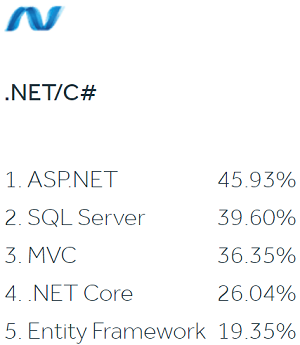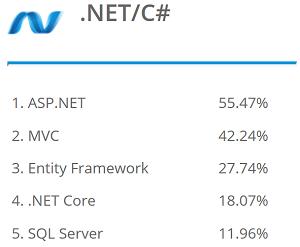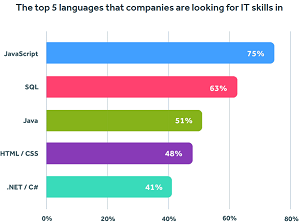News
What's the Most Popular Component in the .NET/C# Tech Stack?
A new development skills report from DevSkiller reveals the most popular components in the .NET/C# tech stack.
The new "DevSkiller IT skills report 2021: Demand and hiring trends" was recently published by the Poland-based company that offers an automated technical screening and talent management platform.
Part of the wide-ranging report -- based on platform usage -- measures popular tech stacks and the most-used components therein. In addition to .NET/C#, these eight tech stacks include JavaScript, Java, SQL, CSS, Python, PHP and DevOps.
The 2021 report finds that for the second year in a row, the most popular component in the .NET/C# tech stack is ASP.NET, used for web development.
The ASP.NET Core variant of ASP.NET includes the popular Blazor component that allows for C# web development instead of JavaScript.
After that, the order of the components differs slightly from last year.
 [Click on image for larger view.] Top .NET/C# Stack Skills in 2021 Report (source: DevSkiller).
[Click on image for larger view.] Top .NET/C# Stack Skills in 2021 Report (source: DevSkiller).
"ASP.NET is seen in almost half of all .NET/C# tech stack," the report said. "ASP.NET leads the way for the .NET/C# tech stack once again with a whopping 45.93 percent. This is the second year running where the ASP.NET web app framework has topped the list, highlighting the continued importance of web development in the .NET/C# tech stack.
".NET server technology, SQL Server (36.90 percent), overtook MVC (36.35 percent) by a narrow margin to come in second place this year. Not far behind was .NET Core with 26.04 percent, while Entity Framework came in the fifth position with 19.35 percent."
 [Click on image for larger view.] Top .NET/C# Stack Skills in 2020 Report (source: DevSkiller).
[Click on image for larger view.] Top .NET/C# Stack Skills in 2020 Report (source: DevSkiller).
Last year's report had the order as: ASP.NET, MVC, Entity Framework, .NET Core and SQL Server. Note that some components carry the "Core" designation that indicates Microsoft's new cross-platform offerings, while others don't. DevSkiller didn't indicate if the components that didn't include the Core designation -- ASP.NET and Entity Framework -- actually referred to the old Windows-only .NET Framework offerings or if they are in fact the more modern versions and the Core part of the name was just left off inadvertently.
DevSkiller also included .NET/C# in its category of top programming languages that companies are looking for IT skills in, finding that .NET/C# barely made the top five:
 [Click on image for larger view.] The Top 5 Languages that Companies Are Looking for IT Skills in (source: DevSkiller).
[Click on image for larger view.] The Top 5 Languages that Companies Are Looking for IT Skills in (source: DevSkiller).
"Despite small changes to specific tech stacks’ overall popularity, the top 5 IT skills that companies are looking for have remained unchanged from last year," the report said. "In 2020, 75 percent of companies were looking for JavaScript developers. SQL came in second place with 63 percent, while Java has dropped slightly to 51 percent. HTML/CSS and .NET/C# have both seen small improvements from last year at 48 percent and 41 percent, respectively."
The .NET/C# stack did fare slightly better in the category of most commonly tested technologies, moving up to fourth place behind Java, JavaScript and SQL and one step ahead of CSS/HTML.
The report also grouped top languages that were tested together, finding that the .NET/C# stack was tested with JavaScript 7.6 percent of the time, again showing the strong web-dev influence.
Other highlights of the report include:
- JavaScript is the most popular language tested together with other IT skills
- React is the most popular technology in the JavaScript tech stack once again, seen in 35 percent of tests
- Google Chrome and Windows 10 are the most popular browser and OS on the platform
- Australian developers score the highest on coding tests
- Companies from Qatar (72.27 percent) have the highest scoring candidates
- Companies from Indonesia (12.11 percent) are the most selective
- Switzerland led the list of countries with highest annual salaries ($95,753 USD)
- The COVID-19 pandemic has caused significant changes in company hiring patterns, resulting in most companies undergoing rapid transformations into remote-friendly or even remote-first workplaces, which has prompted a substantial rise in international hiring
DevSkiller said the data used for the study came from a 365-day snapshot of users on its platform from Dec. 1, 2019, through Dec. 1, 2020. The insights are based on 304,645 coding tests taken through the DevSkiller platform by candidates in 156 countries.
About the Author
David Ramel is an editor and writer for Converge360.